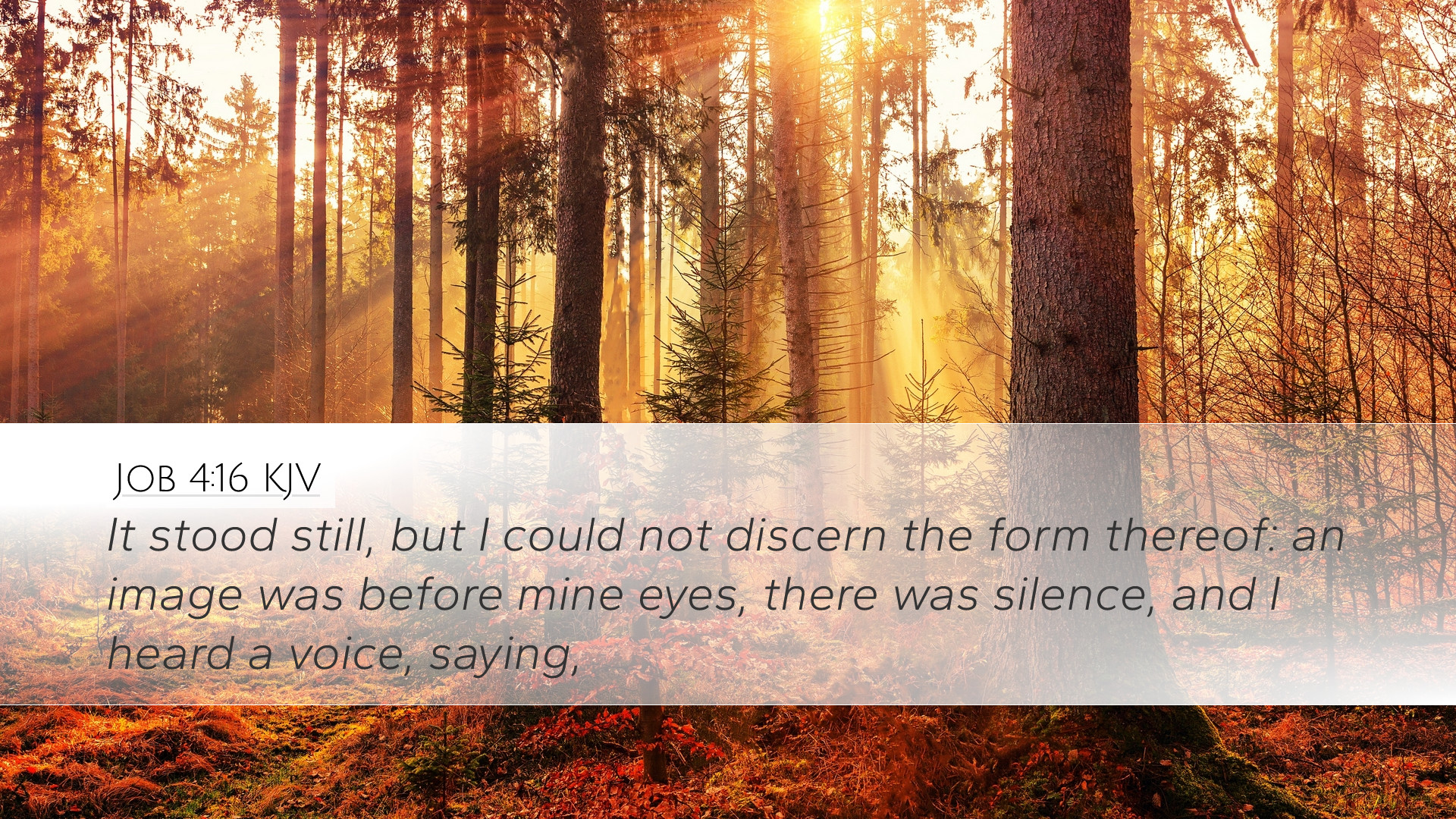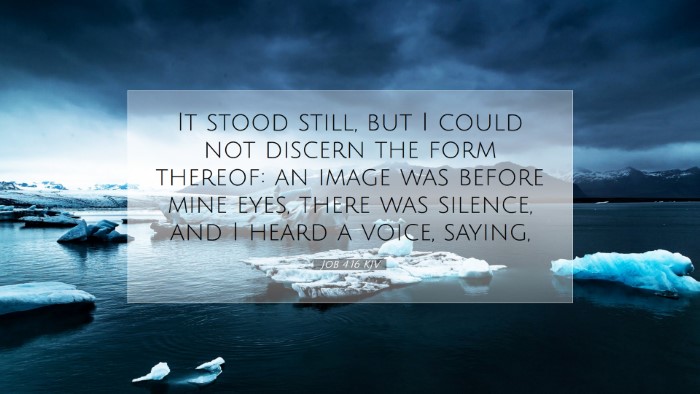Old Testament
Genesis Exodus Leviticus Numbers Deuteronomy Joshua Judges Ruth 1 Samuel 2 Samuel 1 Kings 2 Kings 1 Chronicles 2 Chronicles Ezra Nehemiah Esther Job Psalms Proverbs Ecclesiastes Song of Solomon Isaiah Jeremiah Lamentations Ezekiel Daniel Hosea Joel Amos Obadiah Jonah Micah Nahum Habakkuk Zephaniah Haggai Zechariah MalachiJob 4:16
Job 4:16 KJV
It stood still, but I could not discern the form thereof: an image was before mine eyes, there was silence, and I heard a voice, saying,
Job 4:16 Bible Commentary
Job 4:16 – A Commentary
Job 4:16 states: "It stood still, but I could not discern the form thereof: an image was before mine eyes, there was silence, and I heard a voice, saying," As we delve into the depths of this passage, several key themes and insights emerge from classical public domain commentaries that are beneficial for pastors, students, theologians, and Bible scholars alike.
Contextual Overview
Job chapter 4 marks the beginning of Eliphaz's response to Job's lamentation. It is essential to recognize the role of Eliphaz as one of Job's friends who, in an attempt to comfort Job amidst his calamity, presents a vision of the divine world. His counsel is framed within his own worldly wisdom and personal experience, which, while significant, lacks the depth of divine understanding. This passage illustrates a moment of stillness, a profound encounter with something beyond human comprehension.
Cultural and Historical Insights
The cultural context of ancient Near Eastern thought often intertwined dreams and visions with divine revelation. Eliphaz’s reference to an image and a voice illustrates the common belief that God communicates through profound, sometimes unnerving experiences. The silence he mentions suggests a moment where one is poised to hear the important truths that follow.
Interpretations from Public Domain Commentaries
Matthew Henry's Commentary
Henry emphasizes the significance of this experience as a method through which God reveals His mysteries. He notes that the silence that follows the appearance of this "image" suggests a deep contemplation and fear, which is natural when one stands in the presence of the divine. This silence invites listeners to reflect solemnly on God's infinite wisdom and power. Henry warns against viewing divine visions without acknowledging the weight of silence between them, suggesting that in silence, we may find clarity and insight.
Albert Barnes' Notes on the Bible
Barnes elaborates on the implications of the phrase "I could not discern the form thereof." He points out that human understanding is limited and often cannot grasp the essence of the divine experience. This acknowledgement is crucial for scholars and theologians, as it underscores the boundaries of human perception in relation to God's truths. Barnes’ interpretation invites a humble approach to theology, recognizing that certain divine realities may lie beyond our comprehension. He also notes the voice as God's communication, which conveys a divine message essential for spiritual growth.
Adam Clarke's Commentary
Clarke provides a deeper analysis of the "voice" that was heard. He suggests that it represents both the direct communication of God and the inner prompting of the human conscience. Clarke's interpretation suggests that while Eliphaz has a particular experience, it reflects a broader truth regarding God’s presence and communication with humanity. He emphasizes that the stillness and the apprehended image serve as a metaphor for spiritual awakening, prompting self-reflection and deeper understanding of one’s own life and struggles.
Theological Implications
The events described in Job 4:16 prompt significant theological discourse regarding the nature of God’s communication with humanity. The stillness associated with the divine presence invites believers to consider the role of contemplation and listening in their spiritual lives.
- The Voice of God: This passage indicates that God speaks to His people, though his voice may not always be perceived as distinct. The implication is that believers must cultivate sensitivity to God's communication.
- Limited Human Perception: Eliphaz's struggle to discern the form of what he saw challenges readers to remain humble about their understanding of God. This stands as a lesson in the importance of recognizing the boundaries of human comprehension.
- Silence in Spirituality: The silence preceding divine revelation may suggest that quietness is necessary for genuine contemplation, allowing individuals to discern God's voice amidst the noise of life.
Practical Applications
As we reflect on Job 4:16, several practical applications emerge for ministry and personal spirituality:
- Cultivating Silence: In our fast-paced lives, establishing moments of stillness can aid in discernment and encourage deeper engagement with God's presence.
- Embracing Mystery: Teachers and scholars should guide others in embracing the mystery of God, encouraging an attitude of worship and reverence when encountering the divine, rather than forcing clear interpretations of every aspect.
- Encouraging Sharing of Experiences: Church leaders should promote environments where congregants feel safe sharing their personal encounters with God, even if they cannot explain them fully, fostering community growth and understanding.
Conclusion
Job 4:16 serves as a profound reminder of the interaction between the divine and the human. It invites readers to contemplate their own experiences with God, the limitations of their understanding, and the vital importance of silence in spiritual discernment. As evidenced by the insights drawn from Matthew Henry, Albert Barnes, and Adam Clarke, this verse encourages a posture of humility, reverence, and openness to the mysteries of faith.


